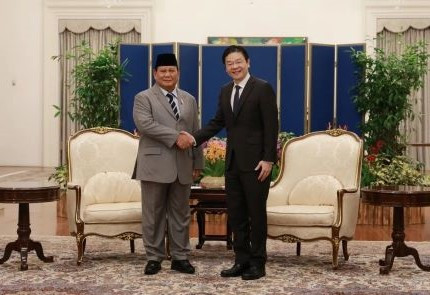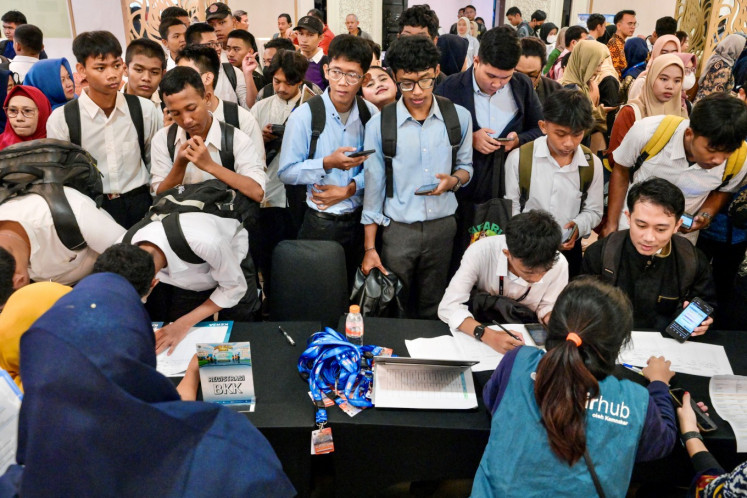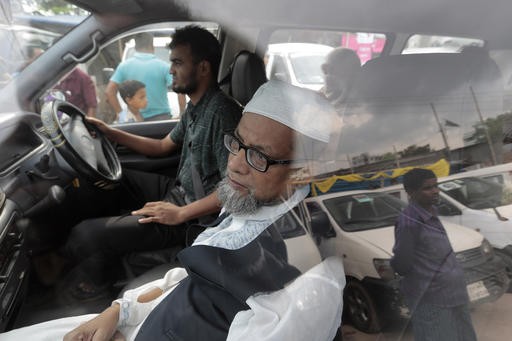Popular Reads
Top Results
Can't find what you're looking for?
View all search resultsPopular Reads
Top Results
Can't find what you're looking for?
View all search resultsDouble continuity: Basis for Singapore-Indonesia economic relations
The promised stability from Prabowo and Wong is crucial for ensuring investor confidence and fostering further collaborations.
Change text size
Gift Premium Articles
to Anyone
W
ith both Indonesia and Singapore seeing significant political changes in 2024, the future of their economic partnership hangs in the balance. Former general Prabowo Subianto and Prime Minister of Singapore Lawrence Wong can leverage the stability they both promised to bring to their terms regarding political and economic vision, policies, and projects. This will provide certainty to investors and sustain the economic growth enjoyed by both parties.
In March, Indonesia announced the results of the 2024 general election, naming Prabowo and Gibran Rakabuming Raka as president and vice-president-elect for the 2024-2029 term. Leadership changes often create uncertainty, disincentivizing investors. However, Prabowo has pledged a smooth transition from the current Joko “Jokowi” Widodo administration by continuing his policies and programs, including the Nusantara new capital city project. This commitment is crucial for maintaining investor confidence and ensuring economic stability.
Across the straits, Singapore’s Lee Hsien Loong handed the baton to Wong on May 15. While the choice of his successor was expected, the timing coincided with Indonesia’s election result. Wong stated there would be no major changes in the upcoming cabinet until the next general election due in 2025. This double permanence promises new mutual growth for Indonesia and Singapore.
The economic relationship between Indonesia and Singapore has always been complementary, with trade between the two countries amounting to US$50.6 billion in 2023. Singapore has been Indonesia’s top source of foreign direct investment since 2014. The promised stability from both leaders is crucial for ensuring investor confidence and fostering further collaborations.
A seamless transition in leadership can ensure a smooth flow of capital, especially as the new administrations galvanize investments into Nusantara and other projects. Indonesia has emerged as one of the most attractive investment destinations, experiencing approximately 5 percent gross domestic product (GDP) growth in the post-pandemic era. This success is supported by robust production capabilities and a large consumer base, positioning Indonesia as not just a market, but also a thriving hub for entrepreneurship.
Investor confidence is further bolstered by specific initiatives such as the 20 Singaporean private investors who have already pledged their intent towards the Nusantara (new capital) project. Meanwhile some organizations have also signed MoUs for investments in East Java’s Special Economic Zone. In the renewable energy sector, collaborative projects such as the planned construction of the largest battery manufacturing and solar power plants in Indonesia illustrate significant investment and cooperation between both countries. These examples underscore the robust and multifaceted nature of economic relations, pointing towards a promising future of enhanced collaboration and mutual growth.
To sustain this economic momentum, investment in talent development and education is crucial. Indonesia, home to more than 2,400 startups, needs access to networks and financing, which Singapore can provide. Singapore’s leadership in technology and innovation also complements Indonesia’s growing tech sector. Joint ventures in fintech, e-commerce, and digital services can spur innovation and create new market opportunities. Such industries also require education and workforce development to mature.
It is thus a win-win for both countries. Singapore’s low fertility rate suggests a future workforce shortage, necessitating complementary foreign talent. Indonesia can provide this talent pipeline. Singapore’s advanced education system, emphasizing skills development, can help train and enhance the productivity and capability of Indonesian workers. This can be done through joint educational programs, vocational training, and talent exchanges.
University education is another prime example of long-term talent exchange. Both countries can benefit from the mobility of students and ideas. At the Indonesia-Singapore Business Forum, current Deputy Prime Minister and Minister for Trade and Industry Gan Kim Yong announced a program for fresh graduates to pursue tech-related jobs in each other’s countries, further supporting the growing entrepreneurship in Indonesia.
BLOCK71, an initiative by NUS Enterprise, has collaborative and strategic partnerships with established corporations and government agencies. It is a tech ecosystem builder and global connector that catalyzes and aggregates the start-up community, spearheads new initiatives, and provides mentorship and growth opportunities in local and global markets.
Across Indonesia, including Jakarta, Bandung, and Yogyakarta, overseas tech companies exploring business opportunities in Indonesia can leverage these facilities to better understand the Indonesian market, set up shop, and expand business networks. Conversely, Indonesia-based entrepreneurs, companies, and investors can learn more about NUS research and technologies, gaining access to Singapore, Southeast Asian, and other international markets.
Despite opportunities, both administrations must ensure that policy continuity does not perpetuate red tape. Indonesia’s rank of 73rd in the ease of doing business index reflects the need for regulatory improvements. Simplifying Indonesia's regulatory framework could enhance its ease of doing business ranking, encouraging more foreign investment.
Businesses and investors will also appreciate a conducive political climate to operate optimally. Looking forward, we can expect to see new partnerships emerging in key sectors that drive growth, such as green energy. Singapore has the potential to contribute to Indonesia’s sustainable energy by providing connectivity to the global market and access to finance.
Both countries are poised for a period of collaboration under their new administrations. This is crucial for maintaining stability and fostering economic growth, particularly in terms of investor confidence, policy consistency, and talent exchange.
By addressing shared challenges through continued collaboration and strategic initiatives, the upcoming administrations have the potential to strengthen bilateral ties and drive economic cooperation for the good of Southeast Asia and the world.
***
The writer is director of the Centre for Governance and Sustainability (CGS) at Business School, National University of Singapore. The views expressed are his own.











